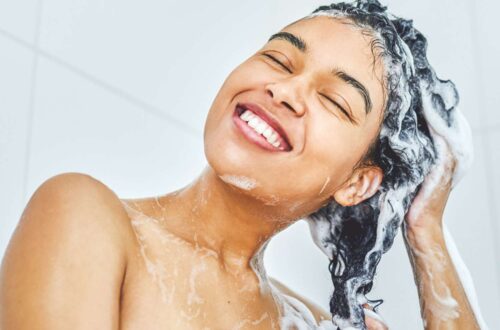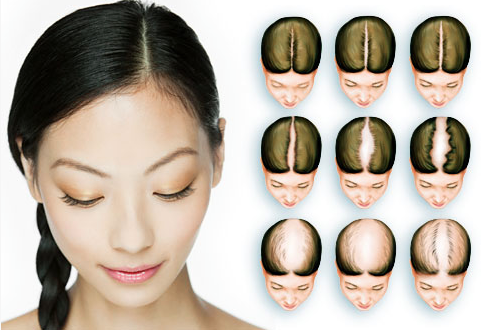Hair loss is a common condition that affects millions of people worldwide. While it is normal to lose some hair every day, excessive hair loss can be a cause for concern. There are several factors that can contribute to hair loss, including genetics, lifestyle, and underlying medical conditions.
In addition to these factors, there are also things that can make hair loss worse. Understanding these factors can help individuals take steps to prevent further hair loss and promote hair growth. In this article, we will explore some of the common things that can make hair loss worse and provide tips on how to manage them.
Click here to find the best products:
What makes hair loss worse?10 Factors that Aggravate Hair Thinning: Discover the Causes
Are you experiencing hair thinning or hair loss? It can be frustrating and distressing, but it’s important to understand that it’s a common problem that affects many people. In this article, we’ll explore 10 factors that aggravate hair thinning and discover the causes behind them.
1. Genetics: One of the primary factors behind hair thinning is genetics. If your parents or grandparents experienced hair loss, there’s a chance that you may as well.
2. Hormonal Changes: Hormonal changes in the body can also lead to hair thinning. These changes can be caused by pregnancy, menopause, or thyroid imbalances.
3. Stress: Chronic stress can also contribute to hair thinning. When you’re stressed, your body produces the hormone cortisol, which can interfere with hair growth.
4. Poor Nutrition: Your hair needs certain nutrients to grow and stay healthy. A diet lacking in certain vitamins and minerals, such as iron or zinc, can lead to hair thinning.
5. Medications: Certain medications, such as chemotherapy drugs, can cause hair thinning as a side effect.
6. Hairstyles: Tight hairstyles that pull on the hair, such as braids or ponytails, can lead to hair thinning over time. This is known as traction alopecia.
7. Heat Styling: Using hot tools on your hair, such as flat irons or curling irons, can damage your hair and lead to thinning over time.
8. Chemical Treatments: Chemical treatments, such as hair dye or perms, can also damage your hair and lead to thinning over time.
9. Aging: As we age, our hair naturally becomes thinner. This is due to a decrease in hair follicles and a decrease in the size of the hair follicles.
10. Medical Conditions: Certain medical conditions, such as alopecia areata or scalp infections, can lead to hair thinning or hair loss.
Knowing the factors that aggravate hair thinning can help you take steps to prevent it. Talk to your doctor if you’re concerned about hair thinning, as they may be able to recommend treatments or lifestyle changes to help you maintain healthy hair.
10 Surprising Factors that Contribute to Hair Loss
Hair loss can be a frustrating and stressful experience for both men and women. And while genetics and aging are often the main culprits, there are some surprising factors that can contribute to hair loss. Here are 10 factors that you might not have known about:
1. Stress: Stress can cause hair loss in both men and women. When you’re stressed, your body produces the hormone cortisol, which can lead to hair loss. Managing stress can help prevent hair loss.
2. Medications: Certain medications can cause hair loss as a side effect. These include blood thinners, antidepressants, and chemotherapy drugs. If you’re experiencing hair loss while taking medication, speak to your doctor.
3. Diet: A poor diet lacking in essential nutrients can lead to hair loss. Make sure you’re getting enough protein, iron, and vitamins A, B, C, and D in your diet.
4. Smoking: Smoking can damage your hair follicles and lead to hair loss over time. Quitting smoking can help prevent hair loss.
5. Hormonal changes: Hormonal changes, such as those that occur during pregnancy or menopause, can cause hair loss in women. Hormonal imbalances in men can also lead to hair loss.
6. Hairstyles: Tight hairstyles, such as braids, ponytails, and cornrows, can cause hair loss over time. Be gentle with your hair and avoid tight hairstyles if you’re experiencing hair loss.
7. Environmental factors: Exposure to pollutants and toxins in the environment can damage your hair and lead to hair loss. Protect your hair from harsh chemicals and pollutants.
8. Medical conditions: Certain medical conditions, such as thyroid disorders and autoimmune diseases, can cause hair loss. Speak to your doctor if you’re experiencing hair loss and suspect an underlying medical condition.
9. Genetics: Genetics play a role in hair loss, with male and female pattern baldness being the most common form of hair loss. If hair loss runs in your family, you may be more likely to experience it.
10. Aging: As we age, our hair naturally becomes thinner and more brittle, which can lead to hair loss. While aging is inevitable, there are steps you can take to slow down the process and promote healthy hair.
If you’re experiencing hair loss, it’s important to speak to your doctor to determine the underlying cause. With the right treatment and lifestyle changes, you can prevent further hair loss and promote healthy hair growth.
10 Effective Tips to Prevent Hair Loss Naturally
Hair loss is a common problem nowadays and can occur due to various reasons such as genetics, stress, hormonal imbalance, poor diet, and certain medical conditions. Losing hair can affect one’s self-esteem and confidence. However, there are natural ways to prevent hair loss and promote hair growth.
Here are 10 effective tips to prevent hair loss naturally:
1. Massage your scalp: Massaging your scalp with warm oil helps to increase blood circulation and stimulate hair growth. Use coconut oil, almond oil or olive oil for best results.
2. Follow a healthy diet: A diet rich in vitamins and minerals such as iron, zinc, and biotin help to nourish hair and prevent hair loss. Include foods such as leafy greens, nuts, eggs, and fish in your diet.
3. Avoid tight hairstyles: Tight hairstyles such as braids and ponytails can cause hair breakage and damage the hair follicles, leading to hair loss. Opt for looser hairstyles such as a messy bun or a loose braid.
4. Use natural hair products: Chemical-based hair products can damage hair and cause hair loss. Use natural hair products such as shampoos and conditioners that contain natural ingredients such as aloe vera, tea tree oil, and lavender oil.
5. Avoid hot tools: Heat styling tools such as straighteners and curling irons can damage hair and cause hair loss. Avoid using them frequently or use them on a low heat setting.
6. Reduce stress: Stress can cause hair loss. Practice stress-reducing techniques such as yoga, meditation, or deep breathing exercises.
7. Get enough sleep: Lack of sleep can lead to hair loss. Aim for at least 7-8 hours of sleep each night to promote hair growth.
8. Stay hydrated: Drinking enough water helps to keep hair hydrated and prevent hair loss. Aim for at least 8 glasses of water per day.
9. Take supplements: Supplements such as biotin, iron, and zinc can help to promote hair growth and prevent hair loss. Consult with a doctor before taking any supplements.
10. Be gentle with your hair: Being rough with your hair when brushing or drying can cause hair breakage and hair loss. Be gentle and use a wide-tooth comb when detangling wet hair.
By following these natural tips, you can prevent hair loss and promote healthy hair growth. However, if you have severe hair loss or thinning, it’s best to consult with a doctor to determine the underlying cause and appropriate treatment.
10 Hair-Thinning Mistakes to Avoid for Healthy Locks: Expert Tips
Thinning hair can be a frustrating and challenging problem to deal with. While genetics and aging can play a role, there are also several hair-thinning mistakes that people make that can contribute to the issue. To help you maintain a healthy head of hair, we’ve compiled a list of 10 hair-thinning mistakes to avoid.
1. Over-washing your hair
Washing your hair too frequently can strip it of its natural oils, leading to dryness and breakage. Aim to wash your hair no more than every other day.
2. Using hot tools too often
Excessive heat styling can damage your hair, leading to thinning and breakage. Try to limit your use of hot tools and always use a heat protectant spray.
3. Tight hairstyles
Tight hairstyles, such as braids, buns, and ponytails, can put too much stress on your hair and lead to thinning and breakage. Opt for looser styles and avoid elastic bands that can pull on your hair.
4. Skipping regular trims
Regular trims can help prevent split ends, which can lead to breakage and thinning. Aim to get a trim every six to eight weeks.
5. Using the wrong hair products
Using the wrong hair products, such as those with harsh chemicals or sulfates, can damage your hair and lead to thinning. Look for products that are gentle and formulated for your hair type.
6. Too much sun exposure
Excessive sun exposure can damage your hair, leading to dryness and breakage. Be sure to wear a hat or use a hair protectant spray when spending time in the sun.
7. Poor diet
A poor diet lacking in essential nutrients can contribute to hair thinning. Be sure to eat a balanced diet rich in protein, vitamins, and minerals.
8. Stress
Stress can cause hormonal imbalances that can lead to hair thinning. Practice stress-reducing techniques such as meditation and exercise.
9. Not drinking enough water
Dehydration can lead to dry, brittle hair that is more prone to breakage and thinning. Aim to drink at least eight glasses of water a day.
10. Ignoring hair loss
If you notice signs of hair loss, such as thinning or bald patches, it’s important to address the issue promptly. Ignoring hair loss can lead to further thinning and even permanent damage.
By avoiding these common hair-thinning mistakes, you can help maintain healthy, strong locks. If you’re still struggling with hair thinning, consider consulting with a hair care professional for personalized advice and treatment options.
Hair loss can be a frustrating and distressing experience, but it is important to understand the factors that can make it worse. Avoiding excessive heat styling, protecting your hair from the sun, managing stress levels, and maintaining a healthy diet and lifestyle can all help to reduce hair loss and promote healthy hair growth. Additionally, it is important to seek professional advice if you are experiencing significant hair loss, as there may be underlying medical conditions that need to be addressed. By taking a proactive approach to hair care and addressing any underlying issues, you can help to minimize the impact of hair loss and maintain healthy, beautiful hair.


